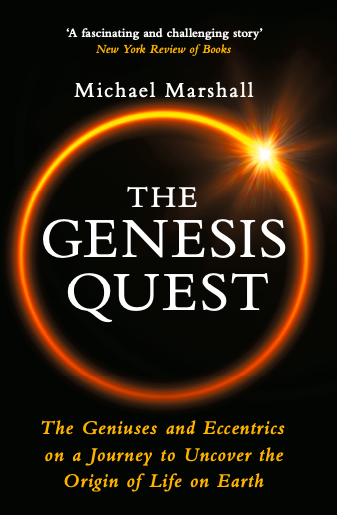The Genesis Quest has been reviewed by science-fiction author Adam Roberts, on his blog Sibilant Fricative. You can read the full review here, but here's the opening paragraph:
"Usually I read books quickly, but this one took me a time, because each chapter is so full of toothsome detail: an expert's guided tour through the many and various scientists who have tried to answer the fundamental question, how did life arise on Earth? It's a question that entails a deeper one, ‘what is life, exactly?’ which Marshall does not shirk. The whole is written with wonderful clarity, occasional moments (especially in the footnotes) of nimble wit, and above all without cutting corners or skimming past any of its rich and fascinating narrative. I know a great deal more about crystals, cells, membranes, RNA, DNA and many other things now than I did before I read this."
I was particular excited about this one because I've been reading Roberts' books for many years. I read his early novels Salt, On and The Snow soon after they were published, and more recently I enjoyed The Thing Itself and have plans to read Purgatory Mount. I can't quite express how joyful it is when someone you've read reads you back, but it's peculiarly satisfying.
Towards the end of his review Roberts writes about consciousness, focusing on how it's seemingly a very recent phenomenon compared to the vast expanse of time for which life has existed on Earth. It so happens that a couple of days ago I gave a talk to Lichfield Science and Engineering Society about the origin of life, and afterwards an audience member asked me about consciousness. Specifically, they wanted to know what came first: life or consciousness?
The obvious answer is that life came first, that the simplest forms of life are wholly unconscious, and that consciousness is something that gradually emerged with the evolution of nervous systems and brains. Perhaps jellyfish have some sparse form of consciousness, but it's far more limited than ours.
This of course doesn't answer the famous "hard problem" of how consciousness can arise from non-conscious components. So some people instead argue for something called panpsychism: the idea that everything in the universe possesses a rudimentary form of consciousness and that in fact consciousness underpins everything. How, they ask, does a proton "know" that it's electromagnetically attracted to an electron, unless it's somehow conscious of it? A version of this idea is explored in Neal Stephenson's Baroque Cycle novels, beginning with Quicksilver. It's also there in Doctor Strange when the Ancient One says: "At the root of existence, mind and matter meet. Thoughts shape reality."
Intriguing as I find panpsychism, I'm dubious about it. I suspect the hard problem of consciousness is one of those things we just have to accept we can't solve. Most of the explanations I've seen for it seem to me to be (well-intentioned) tricks of language rather than true elucidations. There may be limitations to what we can know, and I think this might be one of them.
"Usually I read books quickly, but this one took me a time, because each chapter is so full of toothsome detail: an expert's guided tour through the many and various scientists who have tried to answer the fundamental question, how did life arise on Earth? It's a question that entails a deeper one, ‘what is life, exactly?’ which Marshall does not shirk. The whole is written with wonderful clarity, occasional moments (especially in the footnotes) of nimble wit, and above all without cutting corners or skimming past any of its rich and fascinating narrative. I know a great deal more about crystals, cells, membranes, RNA, DNA and many other things now than I did before I read this."
I was particular excited about this one because I've been reading Roberts' books for many years. I read his early novels Salt, On and The Snow soon after they were published, and more recently I enjoyed The Thing Itself and have plans to read Purgatory Mount. I can't quite express how joyful it is when someone you've read reads you back, but it's peculiarly satisfying.
Towards the end of his review Roberts writes about consciousness, focusing on how it's seemingly a very recent phenomenon compared to the vast expanse of time for which life has existed on Earth. It so happens that a couple of days ago I gave a talk to Lichfield Science and Engineering Society about the origin of life, and afterwards an audience member asked me about consciousness. Specifically, they wanted to know what came first: life or consciousness?
The obvious answer is that life came first, that the simplest forms of life are wholly unconscious, and that consciousness is something that gradually emerged with the evolution of nervous systems and brains. Perhaps jellyfish have some sparse form of consciousness, but it's far more limited than ours.
This of course doesn't answer the famous "hard problem" of how consciousness can arise from non-conscious components. So some people instead argue for something called panpsychism: the idea that everything in the universe possesses a rudimentary form of consciousness and that in fact consciousness underpins everything. How, they ask, does a proton "know" that it's electromagnetically attracted to an electron, unless it's somehow conscious of it? A version of this idea is explored in Neal Stephenson's Baroque Cycle novels, beginning with Quicksilver. It's also there in Doctor Strange when the Ancient One says: "At the root of existence, mind and matter meet. Thoughts shape reality."
Intriguing as I find panpsychism, I'm dubious about it. I suspect the hard problem of consciousness is one of those things we just have to accept we can't solve. Most of the explanations I've seen for it seem to me to be (well-intentioned) tricks of language rather than true elucidations. There may be limitations to what we can know, and I think this might be one of them.

 RSS Feed
RSS Feed